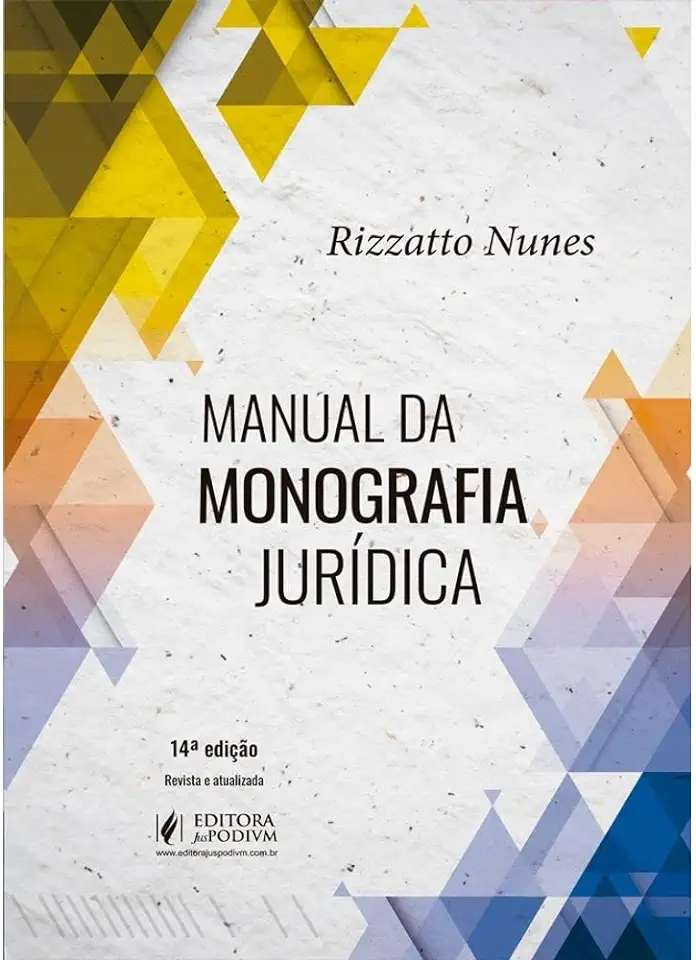
Legal Monograph Manual - Rizzatto Nunes
Legal Monograph Manual: A Comprehensive Guide to Writing and Publishing Legal Monographs
Introduction
The Legal Monograph Manual is an essential resource for anyone interested in writing and publishing legal monographs. This comprehensive guide covers everything from choosing a topic and conducting research to writing and editing your manuscript. With its clear and concise instructions, the Legal Monograph Manual will help you produce a high-quality monograph that will be well-received by both scholars and practitioners.
Why Write a Legal Monograph?
There are many reasons why you might want to write a legal monograph. Perhaps you have a unique perspective on a particular legal issue, or you have conducted groundbreaking research that you want to share with the world. Whatever your reasons, writing a legal monograph can be a rewarding experience that can help you advance your career and make a lasting contribution to the legal field.
Choosing a Topic
The first step in writing a legal monograph is choosing a topic. This is an important decision, as your topic will determine the scope and focus of your monograph. When choosing a topic, there are a few things to keep in mind:
- Your expertise: Choose a topic that you are knowledgeable about and passionate about. This will make the writing process more enjoyable and productive.
- The scope of your monograph: Your monograph should be focused on a specific legal issue or topic. Avoid trying to cover too much ground, as this will make your monograph difficult to read and understand.
- The originality of your research: Your monograph should offer something new and original to the legal field. This could involve presenting a new perspective on an existing issue, or conducting new research that breaks new ground.
Conducting Research
Once you have chosen a topic, you need to conduct research to support your arguments. This involves gathering information from a variety of sources, including:
- Legal sources: This includes cases, statutes, regulations, and law review articles.
- Secondary sources: This includes books, articles, and other scholarly works that discuss your topic.
- Empirical research: This involves conducting your own research, such as surveys, interviews, or experiments.
The amount of research you need to conduct will vary depending on the scope and complexity of your monograph. However, it is important to do your due diligence and ensure that your arguments are well-supported by evidence.
Writing Your Manuscript
Once you have completed your research, you can begin writing your manuscript. The writing process can be divided into several stages:
- Outlining: Before you start writing, it is helpful to create an outline that will help you organize your thoughts and structure your monograph.
- Drafting: This is the stage where you actually write your manuscript. It is important to write in a clear and concise style that is easy to read and understand.
- Revising: Once you have completed your first draft, you need to revise and edit it carefully. This involves checking for errors in grammar, spelling, and punctuation, as well as making sure that your arguments are well-supported by evidence.
Publishing Your Monograph
Once you have completed your manuscript, you need to find a publisher. There are a number of different ways to publish a legal monograph, including:
- Traditional publishing: This involves submitting your manuscript to a traditional publisher, who will then decide whether or not to publish it.
- Self-publishing: This involves publishing your monograph yourself, either through a print-on-demand service or by creating an e-book.
- Open access publishing: This involves publishing your monograph online for free, so that anyone can access it.
The best way to publish your monograph will depend on your individual circumstances. If you are unsure of which option is right for you, it is a good idea to consult with a publishing expert.
Conclusion
The Legal Monograph Manual is an essential resource for anyone interested in writing and publishing legal monographs. This comprehensive guide covers everything from choosing a topic and conducting research to writing and editing your manuscript. With its clear and concise instructions, the Legal Monograph Manual will help you produce a high-quality monograph that will be well-received by both scholars and practitioners.
Enjoyed the summary? Discover all the details and take your reading to the next level — [click here to view the book on Amazon!]